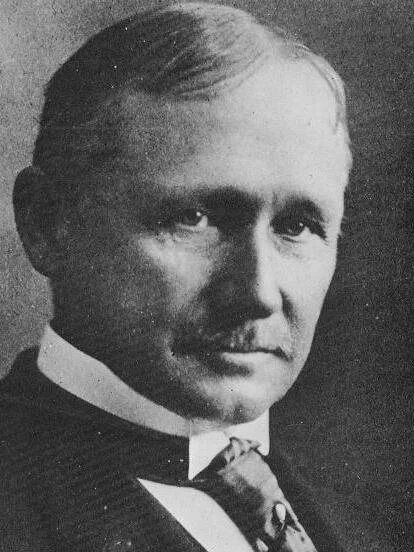Real Celebrities Never Die!
OR
Search For Past Celebrities Whose Birthday You Share

source:wikipedia.org
Frederick Winslow Taylor
Birthday:
20 Mar, 1856
Date of Death:
21 Mar, 1915
Cause of death:
Sequel of Pneumonia
Nationality:
American
Famous As:
Efficiency expert
Age at the time of death:
59
Frederick Winslow Taylor's Quote's
Early Life and Educational Background
Frederick Winslow Taylor, born on March 20, 1856, in Germantown, Philadelphia, grew up in a well-educated Quaker family. From an early age, Taylor displayed a natural curiosity for mechanics and problem-solving. He attended Phillips Exeter Academy and later graduated from Harvard University in 1878. His exposure to engineering principles and the scientific method during his education deeply influenced his career.
Entry into the Manufacturing Sector
Taylor’s career began in the manufacturing industry. He started as an apprentice patternmaker and machinist, where he gained valuable practical experience. This hands-on work shaped his approach to improving efficiency. In 1881, Taylor joined the Midvale Steel Company in Philadelphia. His analytical skills and attention to detail soon earned him the position of chief engineer. It was here that Taylor developed many of his groundbreaking ideas.
Birth of Scientific Management
While at Midvale Steel, Frederick Winslow Taylor formulated his key theories on scientific management. His 1911 publication, “The Principles of Scientific Management”, revolutionised industrial practices. Taylor advocated for a methodical approach to managing tasks, emphasizing time and motion studies and systematic training. His methods sought to maximize efficiency and productivity by optimizing every element of the work process.
The Concept of Time and Motion Studies
One of Taylor’s significant contributions was his development of “time and motion studies.” This process involved carefully analyzing each task to eliminate unnecessary steps. By focusing on reducing waste and improving productivity, Taylor’s techniques helped companies increase output while lowering costs. His scientific approach to task management set the stage for modern production methods.
Widespread Influence and Application
Taylor’s influence extended well beyond the steel industry. He became a highly sought-after consultant, advising companies in various sectors on improving efficiency. From manufacturing to healthcare, his ideas found broad application. His theories were particularly relevant to industrial engineering, where systematic planning and task analysis are crucial.
Criticism of Taylorism
Despite his successes, Frederick Winslow Taylor faced criticism. Many argued that his focus on efficiency neglected the human aspect of labor. Workers often felt dehumanized by the rigid, mechanistic nature of “Taylorism.” Critics believed that his methods sometimes placed productivity above employee well-being, which led to dissatisfaction and resistance among the workforce.
Personal Life and Dedication
Frederick Winslow Taylor was known for his strong work ethic and dedication to scientific management. He maintained a serious and sometimes stern demeanor in both his professional and personal life. Despite opposition to his ideas, Taylor remained committed to spreading the benefits of his management theories until his death on March 21, 1915.
Legacy and Lasting Impact
Frederick Winslow Taylor’s contributions to industrial engineering and organizational management are undeniable. His emphasis on efficiency and systematic analysis laid the foundation for modern management practices. While his methods were controversial, the principles of scientific management continue to influence industries worldwide. Today, Taylor’s legacy is reflected in the ongoing evolution of work processes and the pursuit of efficiency in business operations.
Conclusion
Frederick Winslow Taylor’s life and work exemplify a commitment to innovation and efficiency. His pioneering ideas transformed industrial and organizational practices, leaving a lasting impact on how work is structured today. Though “Taylorism” faced criticism for its perceived neglect of workers’ needs, Taylor’s approach to scientific management continues to shape management theories and business strategies in the modern world.
Name:
Frederick Winslow Taylor
Popular Name:
Frederick Winslow Taylor
Gender:
Male
Cause of Death:
Sequel of Pneumonia
Spouse:
Place of Birth:
Philadelphia, Pennsylvania, U.S.
Place of Death:
Philadelphia, Pennsylvania, U.S.
Occupation / Profession:
Personality Type
Architect: Imaginative and strategic thinkers, with a plan for everything. He was a great strategic planner, and he was able to achieve what he achieved because of this ability.
An avid sportsman, Taylor won the U.S. tennis doubles championship in 1881 with Clarence Clark, marking the first time a U.S. champion was crowned in doubles tennis
A symbol of his time and motion studies, Taylor became known for carrying a stopwatch to measure and analyze the time taken for different tasks. This emphasis on precise measurement became a hallmark of scientific management.
Frederick Winslow Taylor was often referred by the nickname "Speedy Taylor" due to his relentless focus on increasing efficiency and productivity in the workplace.
Taylor's breakthrough moments occurred during his time at the Midvale Steel Company in Philadelphia. He became the chief engineer and implemented many of his scientific management principles.
Elliott Cresson Medal (1921) posthumously
